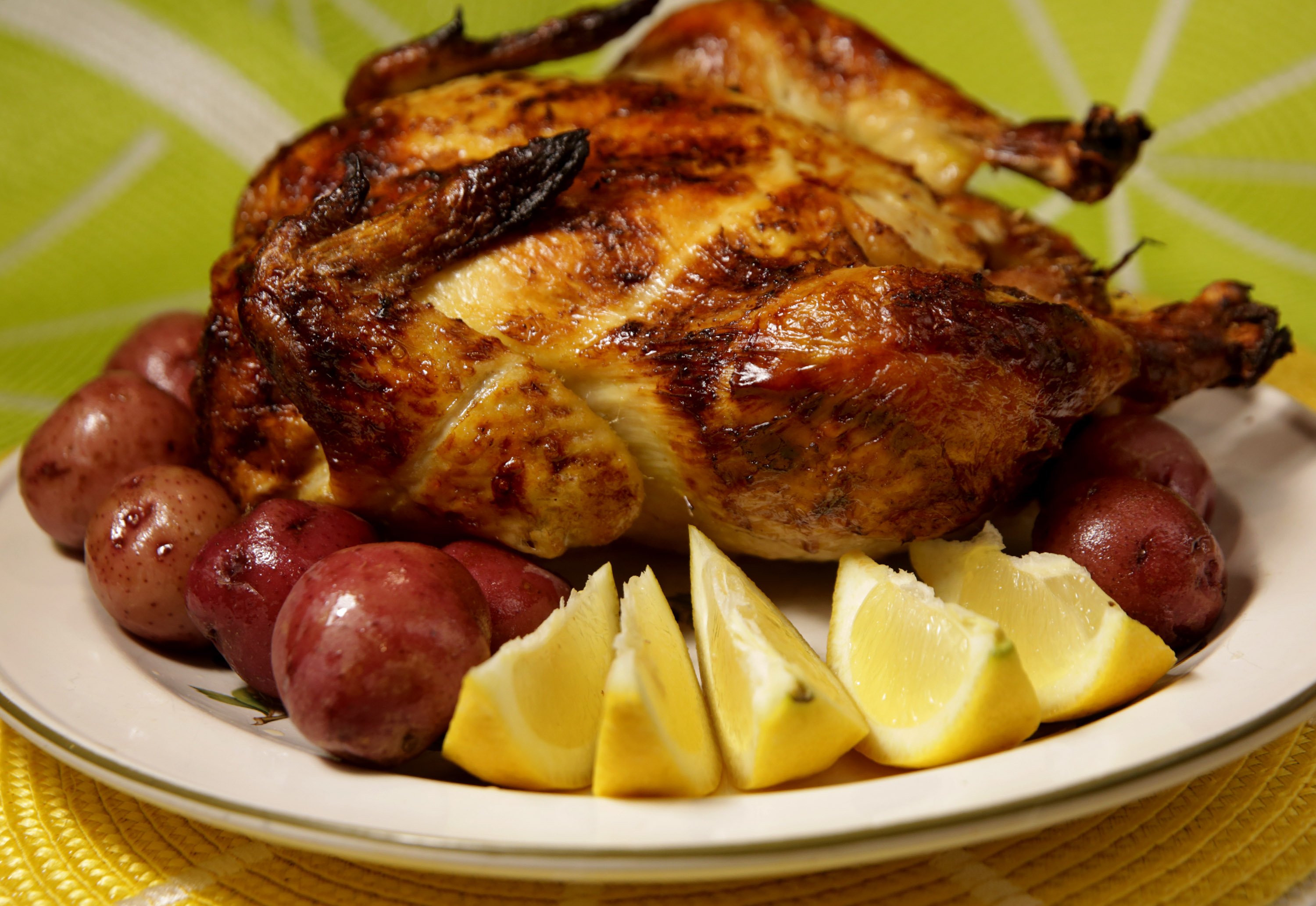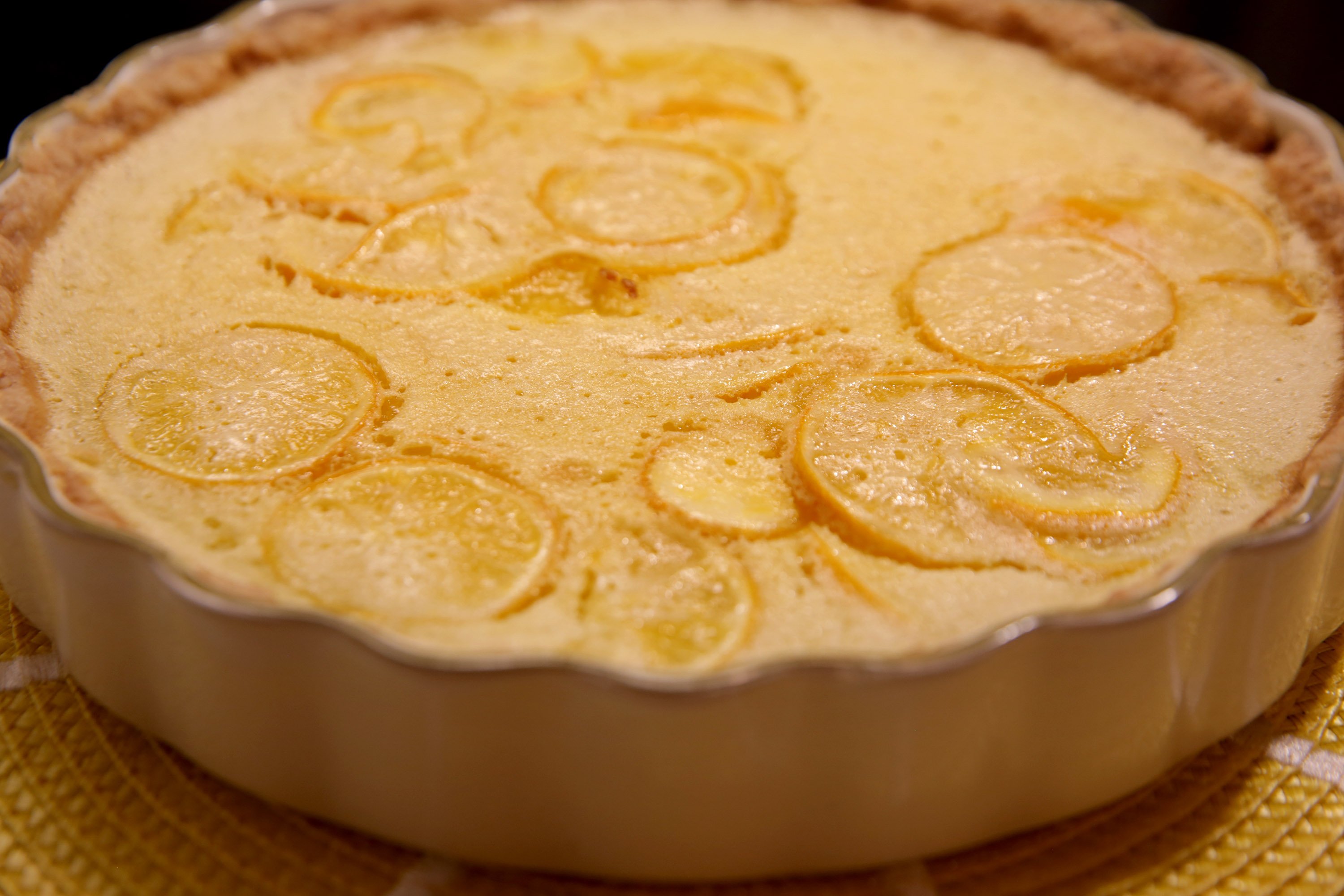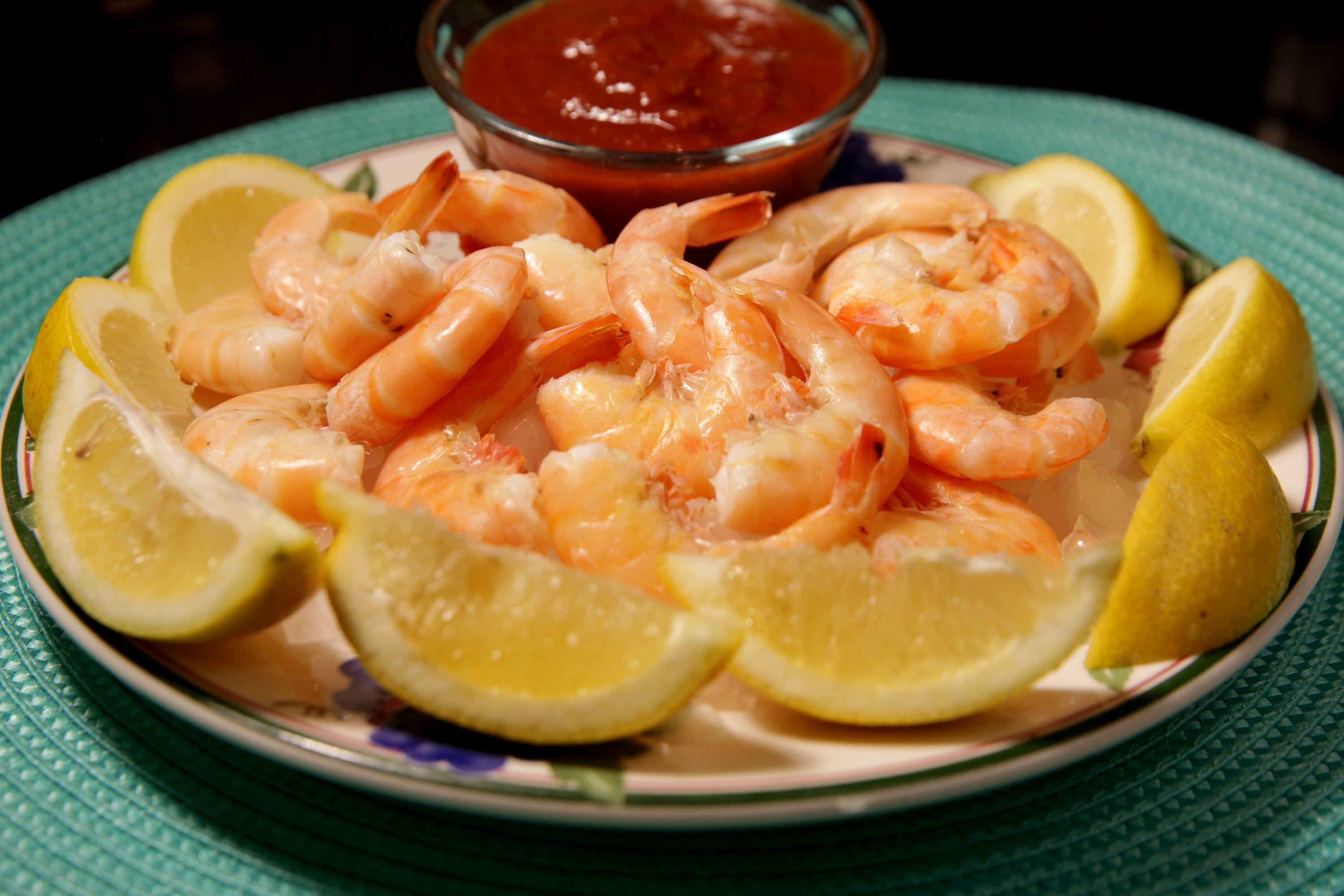Lemons get a bad rap.
When we buy a car that doesn’t run, we call it a lemon. When life gives you lemons, we say you should make lemonade, as if lemons were something merely to be endured.
It’s not fair.
Lemons are bright and sunshiny, brisk and invigorating. They add a delicious splash of life to food, they sprinkle it with the essence of spring.
I say, when life gives you lemons, you should celebrate. Yay, lemons!
It’s time we elevate the humble lemon to the pantheon of culinary flavors. And so I decided to cook four dishes that take full advantage of this most versatile of citrus fruits.
I made dishes that are sweet and savory, main courses and a dessert. How many other ingredients are equally at home inside a pie as well as saddling up to a piece of grilled meat?
I started with shrimp. Lemon is a natural accompaniment to all crustaceans; I don’t think I’ve ever cooked lobster, crab or shrimp without using at least a healthy squeeze or two of lemon.
In order to highlight and focus on the taste of the lemon, I decided to make the shrimp the easiest way I know how: I boiled it.
Usually, when I boil shrimp I use beer or a mixture of beer and water and a bountiful amount of Old Bay seasoning. But this time, I decided to mix lemon juice with water.
In my first attempt, I used Old Bay, too. It tasted great, but it tasted like Old Bay with just a hint of lemon.
So I tried the water and lemon juice alone. It was still good, but not lemony enough. So I tried water and more lemon juice. It was better, but still not lemony enough.
So I tried a proportion of nearly equal amounts of lemon juice and water, and the result was everything I could hope for — bright and lemony, without overpowering the shrimp.
You can serve the shrimp hot or cold. I decided to forego the traditional cocktail sauce, because I wanted to savor the flavor of lemon. But if you think shrimp are indecently naked without cocktail sauce, by all means go ahead and serve it.
I next decided to take advantage of a classic combination of flavors that is often overlooked: lamb with lemon. The tang of the lemon plays a soaring counterpoint to what many people (not me) think of as the gaminess of lamb.
I used tender and flavorful lamb chops, and created a marinade of things that go particularly well with lamb — olive oil, garlic, shallots, Dijon mustard, thyme (or rosemary) and lemon juice, plus salt and pepper. I covered the meat with the marinade for one hour before cooking it.
Usually, I grill my lamb, but not everyone has a grill. So I decided to cook mine on the stove. You don’t get any of the flavor of the fire that way, which is especially desirable with lamb, but you do get more caramelization across the surface of the meat as a trade-off.
It was quicker and easier than using the grill, and the results were marvelous. The lemon was a high note singing clearly and steadily over the earthbound meatiness of the lamb.
When I thought about how to make a lemon chicken, I had a brilliant idea: Why not use the exact same marinade that I had used for the lamb? After all, olive oil, garlic, shallots, Dijon mustard, thyme (or rosemary), lemon juice and salt and pepper all go particularly well with chicken, too.
Usually I grill my chicken, but not everyone has a grill. So I decided to cook mine in the oven. You don’t get any of the flavor of the fire that way, which is especially desirable with chicken, but it is easier to cook, and less fussy.
The chicken tasted great, it was a wonderful roast chicken. But to be honest, it wasn’t lemony enough to be lemon chicken. So I doubled the amount of lemon juice in the marinade and tried again.
The result was subtle, but remarkably pleasant. Not too lemony at all.
For dessert, I had thought to make lemon meringue pie, but I decided that was too commonplace. So I made a lemon Shaker tart.
Reputedly based on a recipe from the Shakers, this tart uses every part of the lemon, skin and all. Well, not the seeds. But it uses the whole lemon, minus the seeds.
I made cookbook author Alison Roman’s recipe, which uses a simple shortbread crust. It’s ridiculously delicious, a buttery, crisp base for the lemon custard to go on top.
The custard is also easy, but it requires some waiting time. You slice a lemon very thin, removing any seeds, and let the slices sit in a mixture of lemon juice and sugar for at least one hour and up to a full day. Then you mix in a lot of egg yolks and whole eggs, along with a bit of flour and a dash of salt, and bake it until you can’t stand how good your house smells.
The tart is an absolute delight, and it is not too sweet as many lemon desserts can be.
Maybe that’s why it’s called a tart.
Lemon-boiled Shrimp
Yield: 4 servings
1/2 cup plus 2 tablespoons lemon juice
3/4 cup plus 2 tablespoons water
1 pound shrimp, with or without shells
For optional cocktail sauce:
3/4 cup chili sauce
1/3 cup ketchup
1 or 2 tablespoons prepared horseradish
1 1/2 teaspoons Worcestershire sauce
Juice from 1 or 2 wedges of lemon
1. In a large pot, bring lemon juice and water to a boil. Add shrimp and boil until shrimp are pink and curled; the time will vary depending on the size of the shrimp. Serve hot or cold.
2. If making a cocktail sauce, combine chili sauce, ketchup, horseradish, Worcestershire sauce and lemon juice in a bowl. Serve with shrimp.
Per serving: 183 calories; 1 g fat; 1 g saturated fat; 183 mg cholesterol; 24 g protein; 21 g carbohydrate; 14 g sugar; 2 g fiber; 1,072 mg sodium; 91 mg calcium
Recipe by Daniel Neman
Lemon Lamb Chops
Yield: 3 to 4 servings
2 pounds lamb chops
1/4 cup lemon juice
1 garlic clove
1 tablespoon roughly chopped shallots
1 teaspoon Dijon mustard
1/2 teaspoon fresh thyme or rosemary leaves
1/4 cup olive oil
Salt and pepper to taste
2 tablespoons oil (not olive oil), if cooking on stove
1. Place lamb chops in a flat dish. Put lemon juice, garlic, shallots, mustard, thyme or rosemary, olive oil and salt and pepper in a blender and blend until smooth. Pour marinade over both sides of lamb and let sit at room temperature for 1 hour, turning once or twice.
2. Set up grill for direct heat or place a large, heavy skillet over high heat and add 2 tablespoons oil. Cook meat, turning once or twice, until desired doneness (about 5 minutes total for medium rare for 3/4-inch chops).
Per serving (based on 4): 413 calories; 25 g fat; 5 g saturated fat; 150 mg cholesterol; 48 g protein; 2 g carbohydrate; 5 g sugar; 2 g fiber; 217 mg sodium; 28 mg calcium
Recipe by Daniel Neman
Lemon Chicken
Yield: 3 to 4 servings
1 (3 1/2 to 4-pound) chicken
1/2 cup lemon juice
1 garlic clove
1 tablespoon roughly chopped shallot
1 teaspoon Dijon mustard
1/2 teaspoon fresh thyme or rosemary leaves
1/4 cup olive oil
Salt and pepper to taste
2 tablespoons oil (not olive oil) if cooking on stove
1. Place chicken in a large bowl. Put lemon juice, garlic, shallots, mustard, thyme or rosemary, olive oil and salt and pepper in a blender and blend until smooth. Pour marinade over and around chicken and let sit at room temperature for 1 hour. Meanwhile, preheat oven to 425 degrees.
2. Place chicken on a rack in a roasting pan (if you don’t have a rack, place it on top of potatoes, carrots, celery or a combination). For the best appearance, truss the legs and wings. Roast in oven until done, about 1 1/4 to 1 1/2 hours, depending on the size of the chicken; if it is getting too brown on top, cover with aluminum foil. The chicken will be done when the legs move freely in their joints.
3. Tent with aluminum foil and wait at least 5 to 10 minutes before carving.
Per serving (based on 4): 565 calories; 41 g fat; 9 g saturated fat; 217 mg cholesterol; 44 g protein; 3 g carbohydrate; 1 g sugar; 1g fiber; 814 mg sodium; 21 mg calcium
Recipe by Daniel Neman
Lemon Shaker Tart
Yield: 8 servings
FOR THE CRUST
1 1/2 cups all-purpose flour
2/3 cup powdered sugar
1 1/2 teaspoons salt
12 tablespoons (11/2 sticks) melted
unsalted butter
FOR THE FILLING
1 Meyer lemon or 1 regular lemon, very thinly sliced, seeds removed (see notes)
1 cup granulated sugar
3/4 cup Meyer lemon juice or regular lemon juice
3 large egg yolks
2 large eggs
1/4 cup all-purpose flour
1/4 teaspoon salt
Notes: Use a sharp or serrated knife to cut the lemons; do not use a mandoline.
— Crust can be baked 2 days ahead, tart can be baked 1 day ahead.
1. Make the crust: Preheat oven to 350 degrees.
2. Combine the flour, powdered sugar and salt in a medium bowl. Drizzle in the melted butter and mix until it’s well combined (it will have a sort of Play-Doh-type texture). Press this into the bottom and up the sides of a 9-inch tart pan or 9-inch springform pan. Use a measuring cup to flatten it and make sure it’s all even.
3. Bake the tart shell until it’s a pale golden brown on the edges and baked through on the bottom (it will lose that greasy shine), about 20 minutes.
4. Make the filling: Toss the lemon slices, granulated sugar and lemon juice in a medium bowl. Let this sit out at least 1 hour or up to 24 hours to soften the peels.
5. Whisk the egg yolks, eggs, flour and salt in a medium bowl, making sure zero lumps remain (if there are stubborn bits of flour, then strain the mixture; otherwise they’ll float to the top and won’t disappear when baked), and add the mixture to the bowl with the lemon slices. Toss everything to combine, then transfer to the crust.
6. Bake the tart until the edges are set and the center just barely jiggles, about 25 to 30 minutes. Let cool completely before slicing.
Per serving: 327 calories; 21 g fat; 12 g saturated fat; 162 mg cholesterol; 6 g protein; 58 g carbohydrate; 36 g sugar; 1 g fiber; 533 mg sodium; 28 mg calcium
Adapted from “Dining In” by Alison Roman

Lemon chicken, Wednesday, April 20, 2022. (Hillary Levin/St. Louis Post-Dispatch/TNS)

Lemon Shaker tart, Wednesday, April 20, 2022. (Hillary Levin/St. Louis Post-Dispatch/TNS)

Lemon-boiled shrimp, Wednesday, April 20, 2022. (Hillary Levin/St. Louis Post-Dispatch/TNS)





